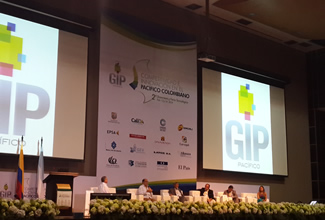
With CAF’s support, workshops were carried out to promote competitiveness and productive development in Buenaventura.
The public and private sectors, together with the communities, exchanged experiences that enable the implementation of a competitive development strategic plan for Buenaventura, making the city's economic and social transformation possible.
(Bogota, February 20th, 2014))-.As a promoter of sustainable development and regional integration, CAF, Development Bank of Latin America, supports the productive and competitive development of Buenaventura by implementing workshops with community leaders, entrepreneurs, unions, and representatives of the academia and the district administration, to consider the main proposals to design an institutional scheme that helps plan, manage, and promote competitiveness, productive development, and urban planning in Buenaventura.
CAF's support in Buenaventura, a port city in the Pacific, is very significant. CAF's Director Representative in Colombia indicated that the Pacific Alliance signed by the four countries, demands a competitive port city to support the alliance and free trade agreements. Colombia must overcome the lag with respect to its Port City.
Traverso pointed out that "this type of initiative enables a participative diagnosis to identify strategic factors that need intervention, with the prospect of creating attractive environments for the development of the city's productive activity". He also stated that these types of projects also seek to generate new investments, to create and consolidate value added dynamics that lead to the development of social inclusion strategies, and a generalized improvement of the quality of life of the population in the city of Buenaventura.
Finally, the process evaluated the economic strengths, the competitive platform, the business environment, and social inclusion of the region, which enabled the identification of 15 critical factors that most limit the possibilities that Buenaventura faces in order to advance.
Among the main factors are the port infrastructure limitations, transportation and its connectivity with the country, basic sanitation deficiencies, ICTs, and the institutional weakness regarding management and the promotion public-private cooperation plans and projects.
CAF's more recent content

CAF, ECLAC, IDB and PAHO Promote Sustainable Development in the G20
The Regional Organizations of the Americas congratulate Brazil on its successful G20 Presidency, highlighting its leadership on key issues such as poverty, governance, and climate change. They also reaffirm their commitment to actions that promote equity and development in the region.
Urgent Call for Action to Safeguard Caribbean SIDS at CAF Symposium
As the global community grapples with the escalating climate crisis, Caribbean Small Island Developing States (SIDS) are running out of time to secure critical investments and support needed to strengthen their economies and protect vulnerable communities from the intensifying impacts of climate change. With the window to take decisive action rapidly shrinking, CAF - Development Bank of Latin America and the Caribbean, in partnership with the Commonwealth Secretariat and the Antigua and Barbuda High Commission, brought together key stakeholders for a symposium in London to address the critical vulnerabilities Caribbean SIDS face.